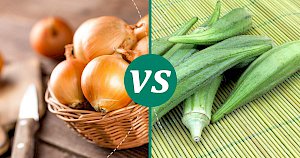Okra vs Onion: Calories & Nutrition Showdown


Okra vs Onion
Nutrition Facts
Serving size:
change
5g10g15g20g30g40g50g60g80g100g120g140g160g180g200g220g250g300g350g400g450g500g600g700g800g900g1000g
1oz2oz3oz4oz5oz6oz7oz8oz10oz12oz15oz20oz25oz30oz35oz40oz50oz
Amount Per Serving:
Serving size:
change
5g10g15g20g30g40g50g60g80g100g120g140g160g180g200g220g250g300g350g400g450g500g600g700g800g900g1000g
1oz2oz3oz4oz5oz6oz7oz8oz10oz12oz15oz20oz25oz30oz35oz40oz50oz
Amount Per Serving:
Okra vs Onion 100g Compare
| per 100g | Okra | Onion |
|---|---|---|
| Calories | 33 | 40 |
| Carbohydrates | 7.5 g | 9.34 g |
| Fat | 0.1 g | 0.1 g |
| Dietary fiber | 3.8 g | 1.7 g |
| Protein | 2 g | 1.1 g |
| Calcium | 81 mg | 23 mg |
| Iron | 0.8 mg | 0.21 mg |
| Magnessium | 57 mg | 10 mg |
| Potassium | 303 mg | 146 mg |
| Sodium | 8 mg | 4 mg |
| Vitaminium A | 375 µg | 2 µg |
| Vitaminium B1 (Thiamine) | 0.2 mg | 0.046 mg |
| Vitaminium B2 (riboflavin) | 0.06 mg | 0.027 mg |
| Vitaminium B3 (Niacin) | 1 mg | 0.116 mg |
| Vitaminium B5 | 0.245 mg | 0.123 mg |
| Vitaminium B6 | 0.215 mg | 0.12 mg |
| Vitaminium B9 (Folic acid) | 88 mg | 0.019 mg |
| Vitaminium C | 21.1 mg | 7.4 mg |
| Vitaminium E | 0.36 mg | 0.02 mg |
| Beta karoten | 225 mg | 1 mg |
A Closer Look at Okra and Onion
Okra and onion, two staples in kitchens around the globe, offer more than just unique flavors to our dishes. Beyond their culinary uses, these vegetables are packed with nutritional benefits that cater to a healthy lifestyle. While okra, with its distinctive slimy texture and grassy flavor, is often found in soups, stews, and salads, onions add a pungent, sharp taste that can transform any meal. But when it comes to their nutritional profiles, how do they compare? Let's dive into the world of okra and onion to discover their health benefits.
Nutritional Content: A Comparative Overview
At first glance, the calorie content of okra and onion is relatively similar, with okra containing 33 calories per 100 grams and onion slightly higher at 40 calories. However, the differences become more pronounced as we delve deeper into their nutritional makeup.
- Carbohydrates and Fiber: Okra leads with 7.5 grams of carbohydrates and an impressive 3.8 grams of fiber, compared to onion's 9.34 grams of carbohydrates and 1.7 grams of fiber. This high fiber content in okra supports digestive health and can aid in weight management.
- Protein: Okra also has a slight edge in protein content, offering 2 grams per 100 grams, whereas onions provide 1.1 grams. While neither is a protein powerhouse, okra offers a bit more to support muscle growth and repair.
- Vitamins and Minerals: Okra is rich in vitamins and minerals, including vitamin C, vitamin K, and magnesium. It significantly outshines onion in calcium, magnesium, and potassium levels, making it a great choice for bone health, muscle function, and blood pressure regulation.
- Low Glycemic Index: Both vegetables have a low glycemic index, with okra at 10 and onion at 15, making them excellent choices for blood sugar management.
What Does This Mean for Your Diet?
Choosing between okra and onion isn't just about taste preferences; it also depends on your nutritional needs. If you're looking for a vegetable high in fiber, vitamins, and minerals, okra is a standout choice. However, onions bring their own set of benefits, including contributions to heart health and potent antioxidants.
Ultimately, both okra and onion are nutritious additions to any diet, offering a range of health benefits. By incorporating both into your meals, you can enjoy a diverse array of flavors and nutritional advantages. Whether you're sautéing, roasting, or adding them raw to salads, these vegetables are versatile and healthful options for any meal.
In conclusion, while okra might have a slight nutritional edge in certain areas, both these vegetables are worthy of inclusion in your diet for their distinct health benefits and flavors. So, the next time you're planning your meals, consider how you can incorporate both okra and onion to not only spice up your dishes but also boost your nutritional intake.
Okra 100g
33kcalCalories source
- 77% CARBS.
- 21% PROTEIN
- 2% FAT
Onion 100g
40kcalCalories source
- 88% CARBS
- 10% PROTEIN
- 2% FAT
Compares of okra
- Okra vs Asparagus
- Okra vs Beetroot
- Okra vs Bitter Melon
- Okra vs Bok Choy
- Okra vs Broccoli
- Okra vs Brussels Sprouts
- see all compares of okra
Marcin Piotrowicz
calories-info.com creator
Healthy diet and healthy lifestyle promoter
Add comment